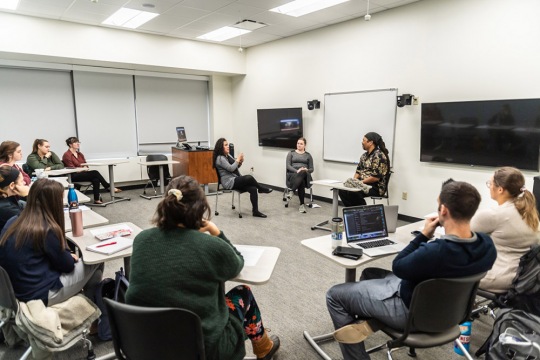
Lisa Prinzi
Assistant Professor, ASL and Interpreting Education
Department of ASL and Interpreting Education
National Technical Institute for the Deaf
Lisa Prinzi
Assistant Professor, ASL and Interpreting Education
Department of ASL and Interpreting Education
National Technical Institute for the Deaf
Education
AAS, BS, MS, Rochester Institute of Technology
Select Scholarship
Invited Keynote/Presentation
Prinzi, Lisa M. "Deaf students’ and interpreters’ positioning in mainstream classrooms: A collaborative approach." Webinar. Language First. West Henrietta, New York. 30 Mar. 2025. Guest Lecture.
Prinzi, Lisa M. and Danny Maffia. "The interpreter’s role in the classroom: A collaborative approach." Educational Interpreting Series. Registry of Interpreters for the Deaf. West Henrietta, New York. 5 Jun. 2025. Guest Lecture.
Prinzi, Lisa M. "Positioning in mainstream classrooms: A collaborative approach." Deaf and Hard of Hearing Masterclass Series. Next Sense. Sydney, Australia. 2 Jun. 2025. Guest Lecture.
Prinzi, Lisa M. "Educational interpreters’ perspectives on performance analysis and feedback." More Than Words. International Congress on the Education of the Deaf. Rome, Italy. 10 Jul. 2025. Guest Lecture.
Manuscripts Submitted for Publication
Prinzi, Lisa M. "Positioning and autonomy in mainstream classrooms." In Press. MS - manuscript (handwritten).
Prinzi, Lisa M. "Critical Mass and Positioning in Mainstream Deaf Educatio." 30 Aug. 2025. MS - manuscript (handwritten).
Prinzi, Lisa M. and Kim Kurz. "Positioning Educational Interpreters: Collaborative Learning and Feedback Practices in the Certificate in Educational Interpreting." 30 Aug. 2025. MS - manuscript (handwritten).
Journal Paper
Prinzi, Lisa M. "The Interpreter’s Role and Deaf Students’ Autonomy in Mainstream Classrooms." Journal of Deaf Studies and Deaf Education 29. 3 (2024): 412-423. Web.
Prinzi, Lisa M. "Deaf Student–Interpreter Relationships and Feedback Practices in K-12 Mainstream Deaf Education." Journal of Deaf Studies and Deaf Education. (2022): 0. Web.
Peer Reviewed/Juried Poster Presentation or Conference Paper
Prinzi, Lisa M. and Kim B. Kurz. "The Certificate in Educational Interpreting: Interpreter Perspectives on Online Professional Development." Proceedings of the Conference of Interpreter Trainers, Berkely CA November 2024. Ed. Rafael Treviño, PhD, Lead Editor Erica Alley, PhD, Co-editor Lucy James, EdD, Co-editor. Berkely, CA: n.p..
Prinzi, Lisa and Kim B. Kurz. "The Certificate in Educational Interpreting (CEI) 2022-2023: Perspectives on Specialized Professional Development." Proceedings of the Registry of Interpreters for the Deaf. Ed. NA. Baltimore, MD: n.p..
Book Chapter
Prinzi, Lisa M. and Jeanne M. Wells. "The Art of Performance Analysis." Signed Language Interpreting Pedagogy: Insights and Innovations from the Conference of Interpreter Trainers. Ed. Rachel E. Herring and Laurie Swabey. Washington, DC: Gallaudet University Press, 2022. 27-37. Print.
Dissertation/Thesis
Prinzi, Lisa M. "From Two Vantage Points: The Influence of Interpreters’ Roles on Deaf Students’ Positioning in Mainstream Classrooms." Diss. University of New York at Buffalo, 2021. Print.
Currently Teaching
INTP-215
Processing Skills Development
3 Credits
The act of interpretation is a complex cognitive challenge. Isolating and mastering specific subtasks of the interpreting process is critical for the synthesis of these subskills in the process of translation and interpretation. This course is an introduction to the cognitive processing skills necessary for translation, consecutive interpretation, and simultaneous interpretation. The course includes an overview of theoretical models of translation and interpretation, the development of basic processing subskills that provide a foundation for translation and interpretation, and practice activities for the integration of these tasks in an 8-step discourse analysis process for translation and consecutive interpreting. Course content includes interpreting and translation theory, message analysis, visualization, shadowing, paraphrasing, dual task training, and text analysis.
INTP-310
Interpreting I
3 Credits
This course introduces the English-to-ASL and ASL-to-English interpreting process with a focus on text analysis and consecutive production of an equivalent target language message. Compression and expansion strategies are introduced. Students develop interpreting management strategies and diagnostic assessment skills. Students interpret monologic and dialogic inquiry and narrative text formats while learning the interpretation process. Students also learn and integrate the features of biomechanics for interpreters to practice safe work habits.
INTP-350
Practicum and Seminar I
3 Credits
This course combines an introductory practicum experience in the field of ASL-English interpretation with a seminar component to allow senior-level students to engage in reflective practice as they transition into the interpreting profession. Students will undertake field experiences that provide them with firsthand knowledge and familiarity with current topics that impact professional sign language interpreters and the Deaf community. Practicum will also give students the opportunity to gain firsthand experience under the immediate supervision of a professional interpreter, who functions as each student’s mentor. The practicum experience will involve activities such as observing a mentor and other interpreters at work; interpreting under the supervision of a mentor; and weekly meetings with a mentor to discuss the practicum experience and to receive professional feedback. Building upon students’ practicum experiences, students will use the constructs of Demand Control Schema to guide their seminar discussions. Students will meet together weekly with their classmates to share observations and experiences gained from the practicum placement. Seminar topics derived from students' field experience will focus on language issues in interpretation, ethical decision making, application of the Code of Professional Conduct, making interpretation choices, and implementing successful business practices as a professional interpreter. Students must complete a minimum of 100 hours of field experience and related activities.
INTP-360
Introduction to K-12 Interpreting
3 Credits
This course includes an overview of the history and current status of educational interpreting throughout the United States. Content includes the role, practices, and skills of educational interpreters in K-12 settings; communication systems; pertinent laws and regulations; resources, information, and strategies for consumer awareness and education; administrative practices and personnel structure of school systems; assessment and management of educational interpreters; and topics that concern educational interpreters.
In the News
-
June 9, 2021

RIT/NTID accepting applications for online educational interpreting certificate
To help meet the increasing demand for qualified ASL-English interpreters in educational settings, NTID is introducing a Certificate in Educational Interpreting. The program will be taught exclusively online and will run from September 2021 to May 2022.




